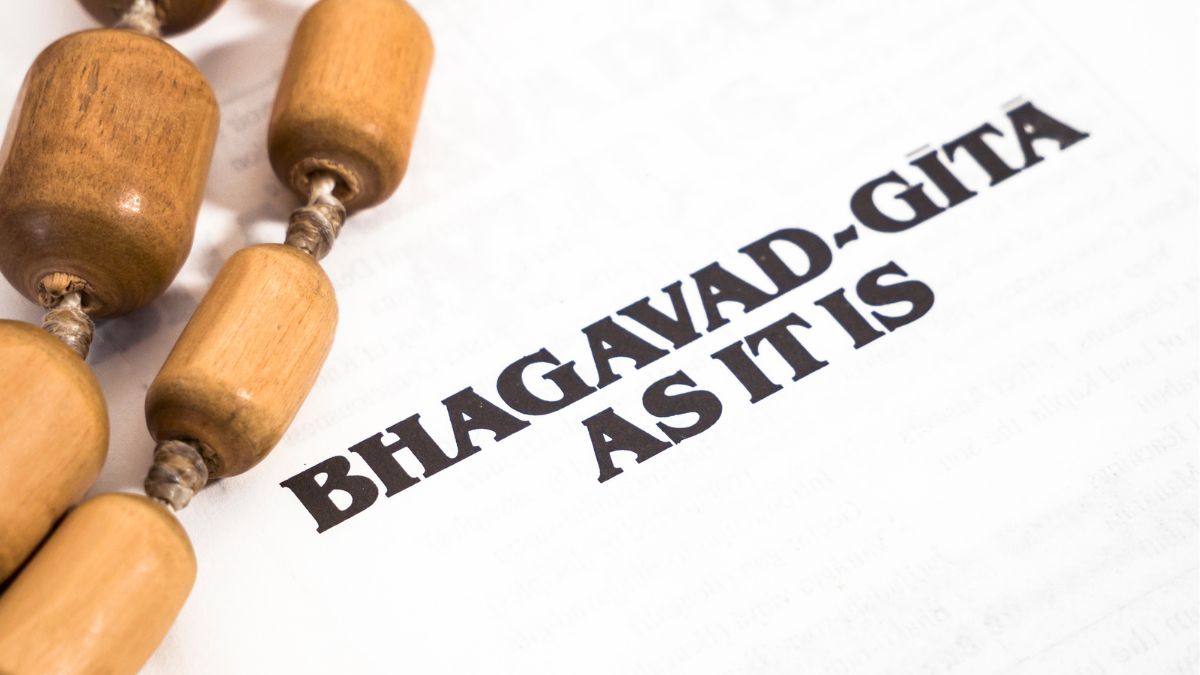- By Kashish Rai
- Wed, 05 Jun 2024 06:42 PM (IST)
- Source:JND
The adage, "For every problem, there is a solution," is well-known. All we need to do is recognise and use it. The Shrimad Bhagavad Gita, spoken by Lord Shri Krishna himself provides the answer. It explains why humans exist and focuses on all the challenges, complications, and answers that each person must overcome in order to survive. The narrative of a conversation between warrior Arjun and his charioteer, Lord Krishna, is told in the Bhagavad Gita. Arjun receives lessons from Lord Krishna on a variety of topics, including Dharma, Karma, spiritual and material differences, Bhakti yoga, the difference between the body and the soul, Aatma and Parmatma, and how to develop the virtue of life.
Let us check out 5 significant shlokas from Shrimad Bhagavad GIta that can help an individual solve everyday problems of life.
5 Shlokas From Bhagavad Gita To Solve Problems Of Life
1. Shloka 2.14 (Chapter 2, Verse 14)
मात्रास्पर्शास्तु कौन्तेय शीतोष्णसुखदुःखदाः ।
आगमापायिनोऽनित्यास्तांस्तितिक्षस्व भारत ।।
mātrā-sparśhās tu kaunteya śhītoṣhṇa-sukha-duḥkha-dāḥ
āgamāpāyino ’nityās tans-titikṣhasva bhārata
Bhagavad Gita shloka 2.14 tells us that both enjoyment and suffering are transient in life, just like the winter and summer seasons. Happiness and suffering come and go in the same way as summer and winter arrive and go. Consequently, we must develop the ability to take both joy and sorrow in a calm manner and prevent them from upsetting our inner tranquilly. The capacity to withstand life's ups and downs without becoming overwhelmed by them is something we should work on.
2. Shloka 3.19 (Chapter 3, Verse 19)
तस्मादसक्तः सततं कार्यं कर्म समाचर।
असक्तो ह्याचरन् कर्म परं आप्नोति पूरुषः।।
tasmād asaktaḥ satataṁ kāryaṁ karma samāchara
asakto hyācharan karma param āpnoti pūruṣhaḥ
Bhagavad Gita Shloka 3.19 emphasises the value of maintaining objectivity while carrying out our responsibilities. It highlights that rather than worrying about the outcome, one should concentrate on carrying out their responsibilities with honesty and devotion. By doing this, we can arrive to a condition of tranquilly and inner peace, which leads to the ultimate objective of spiritual emancipation.
3. Shloka 3.21 (Chapter 3, Verse 21)
यद्यदाचरति श्रेष्ठस्तत्तदेवेतरो जनः।
स यत्प्रमाणं कुरुते लोकस्तदनुवर्तते।।
yad yad ācharati śhreṣhṭhas tat tad evetaro janaḥ
sa yat pramāṇaṁ kurute lokas tad anuvartate
This is just another significant verse from the Bhagavad Gita, teaching that people often emulate the behaviour of individuals they see as significant or heroic. Consequently, as others will imitate individuals in positions of leadership or influence, it is critical that they set a good example and behave morally and ethically.

The Shrimad Bhagavad Gita is a discourse between Lord Krishna and Arjuna on the battlefield of Kurukshetra. (Image Source: Canva)
4. Shloka 3.35 (Chapter 3, Verse 35)
श्रेयान् स्वधर्मो विगुणः परधर्मात्स्वनुष्ठितात्।
स्वधर्मे निधनं श्रेयः परधर्मो भयावहः॥
śhreyān swa-dharmo viguṇaḥ para-dharmāt sv-anuṣhṭhitāt
swa-dharme nidhanaṁ śhreyaḥ para-dharmo bhayāvahaḥ
While carrying out one's own responsibilities offers satisfaction and fulfilment, carrying out someone else's might cause anxiety and unease. As such, the individual needs to concentrate on fulfilling their own dharma, which is their innate responsibility or life's mission, to the best of their abilities.
5. Shloka 18.58 (Chapter 18, Verse 58)
मच्चित्तः सर्वदुर्गाणि मत्प्रसादात्तरिष्यसि।
अथ चेत्त्वमहङ्कारान्न श्रोष्यसि विनङ्क्ष्यसि॥
mac-cittaḥ sarvadurgāṇi matprasādāttariṣyasi
atha cettvamahaṅkārānna śroṣyasi vinaṅkṣyasi
ALSO READ: 5 Vastu Tips To MUST Follow If You Work From Home To Maximise Success
The Shloka emphasises the value of submitting to God and asking for His grace since doing so can offer protection from all problems and hardships. It inspires people to surrender their egos and approach God in humility. Failing to do so might result in failure and impede spiritual development.

